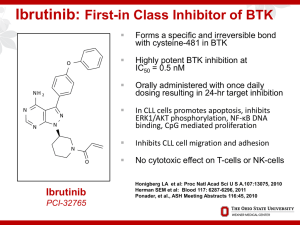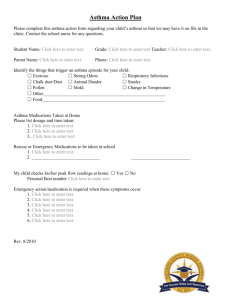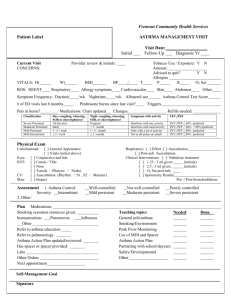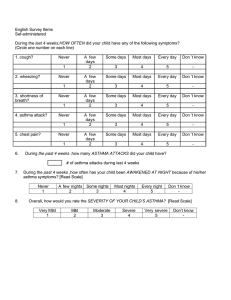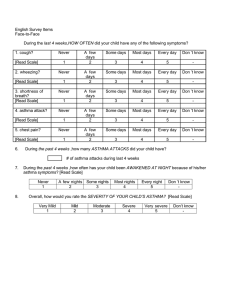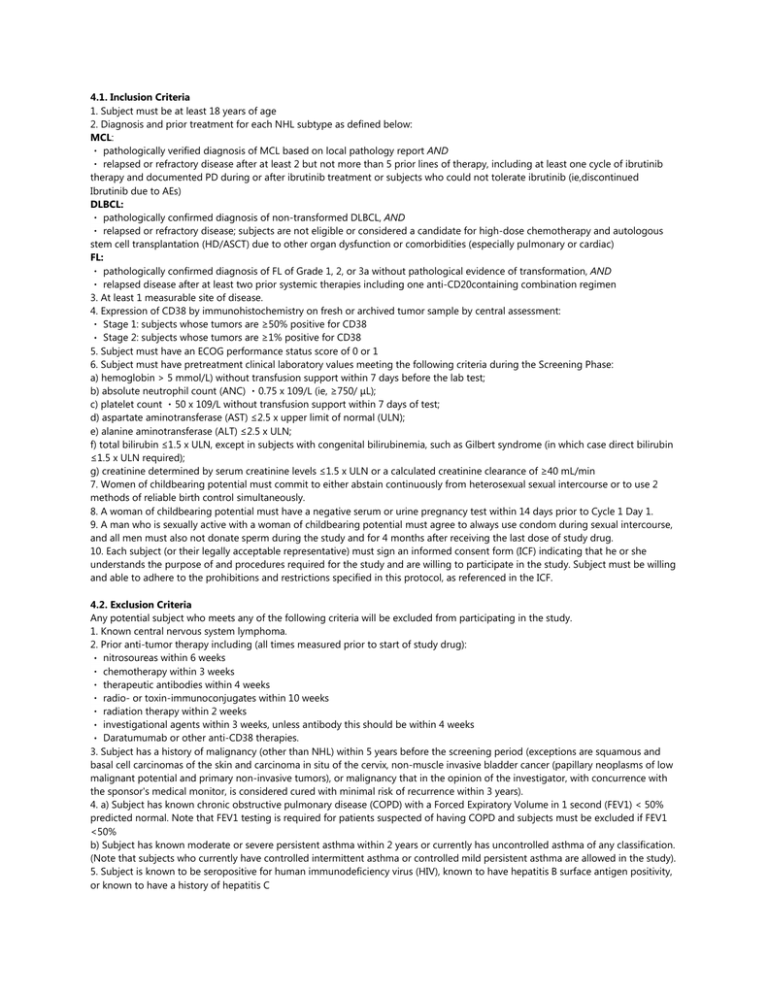
4.1. Inclusion Criteria
1. Subject must be at least 18 years of age
2. Diagnosis and prior treatment for each NHL subtype as defined below:
MCL:
pathologically verified diagnosis of MCL based on local pathology report AND
relapsed or refractory disease after at least 2 but not more than 5 prior lines of therapy, including at least one cycle of ibrutinib
therapy and documented PD during or after ibrutinib treatment or subjects who could not tolerate ibrutinib (ie,discontinued
Ibrutinib due to AEs)
DLBCL:
pathologically confirmed diagnosis of non-transformed DLBCL, AND
relapsed or refractory disease; subjects are not eligible or considered a candidate for high-dose chemotherapy and autologous
stem cell transplantation (HD/ASCT) due to other organ dysfunction or comorbidities (especially pulmonary or cardiac)
FL:
pathologically confirmed diagnosis of FL of Grade 1, 2, or 3a without pathological evidence of transformation, AND
relapsed disease after at least two prior systemic therapies including one anti-CD20containing combination regimen
3. At least 1 measurable site of disease.
4. Expression of CD38 by immunohistochemistry on fresh or archived tumor sample by central assessment:
Stage 1: subjects whose tumors are ≥50% positive for CD38
Stage 2: subjects whose tumors are ≥1% positive for CD38
5. Subject must have an ECOG performance status score of 0 or 1
6. Subject must have pretreatment clinical laboratory values meeting the following criteria during the Screening Phase:
a) hemoglobin > 5 mmol/L) without transfusion support within 7 days before the lab test;
b) absolute neutrophil count (ANC) 0.75 x 109/L (ie, ≥750/ μL);
c) platelet count 50 x 109/L without transfusion support within 7 days of test;
d) aspartate aminotransferase (AST) ≤2.5 x upper limit of normal (ULN);
e) alanine aminotransferase (ALT) ≤2.5 x ULN;
f) total bilirubin ≤1.5 x ULN, except in subjects with congenital bilirubinemia, such as Gilbert syndrome (in which case direct bilirubin
≤1.5 x ULN required);
g) creatinine determined by serum creatinine levels ≤1.5 x ULN or a calculated creatinine clearance of ≥40 mL/min
7. Women of childbearing potential must commit to either abstain continuously from heterosexual sexual intercourse or to use 2
methods of reliable birth control simultaneously.
8. A woman of childbearing potential must have a negative serum or urine pregnancy test within 14 days prior to Cycle 1 Day 1.
9. A man who is sexually active with a woman of childbearing potential must agree to always use condom during sexual intercourse,
and all men must also not donate sperm during the study and for 4 months after receiving the last dose of study drug.
10. Each subject (or their legally acceptable representative) must sign an informed consent form (ICF) indicating that he or she
understands the purpose of and procedures required for the study and are willing to participate in the study. Subject must be willing
and able to adhere to the prohibitions and restrictions specified in this protocol, as referenced in the ICF.
4.2. Exclusion Criteria
Any potential subject who meets any of the following criteria will be excluded from participating in the study.
1. Known central nervous system lymphoma.
2. Prior anti-tumor therapy including (all times measured prior to start of study drug):
nitrosoureas within 6 weeks
chemotherapy within 3 weeks
therapeutic antibodies within 4 weeks
radio- or toxin-immunoconjugates within 10 weeks
radiation therapy within 2 weeks
investigational agents within 3 weeks, unless antibody this should be within 4 weeks
Daratumumab or other anti-CD38 therapies.
3. Subject has a history of malignancy (other than NHL) within 5 years before the screening period (exceptions are squamous and
basal cell carcinomas of the skin and carcinoma in situ of the cervix, non-muscle invasive bladder cancer (papillary neoplasms of low
malignant potential and primary non-invasive tumors), or malignancy that in the opinion of the investigator, with concurrence with
the sponsor's medical monitor, is considered cured with minimal risk of recurrence within 3 years).
4. a) Subject has known chronic obstructive pulmonary disease (COPD) with a Forced Expiratory Volume in 1 second (FEV1) < 50%
predicted normal. Note that FEV1 testing is required for patients suspected of having COPD and subjects must be excluded if FEV1
<50%
b) Subject has known moderate or severe persistent asthma within 2 years or currently has uncontrolled asthma of any classification.
(Note that subjects who currently have controlled intermittent asthma or controlled mild persistent asthma are allowed in the study).
5. Subject is known to be seropositive for human immunodeficiency virus (HIV), known to have hepatitis B surface antigen positivity,
or known to have a history of hepatitis C
6. Subject has any concurrent medical or psychiatric condition or disease (eg, autoimmune disease, active systemic disease,
myelodysplasia) that is likely to interfere with the study procedures or results, or that in the opinion of the investigator, would
constitute a hazard for participating in this study.
7. Subject has clinically significant cardiac disease, including:
myocardial infarction within 1 year before the screening period, or an unstable or uncontrolled disease/condition related to or
affecting cardiac function (eg, unstable angina, congestive heart failure, New York Heart Association Class III-IV)
uncontrolled cardiac arrhythmia (NCI CTCAE Version 4 Grade ≥2) or clinically significant ECG abnormalities
screening 12-lead ECG showing a baseline QT interval as corrected by Fridericia’s formula (QTcF) >470 msec
8. Subject has known allergies, hypersensitivity, or intolerance to monoclonal antibodies or human proteins, or their excipients
9. Vaccination with live attenuated vaccines within 4 weeks of first study agent administration
10. Subject is known or suspected of not being able to comply with the study protocol (eg, because of alcoholism, drug dependency,
or psychological disorder). Subject has any condition for which, in the opinion of the investigator, participation would not be in the
best interest of the subject (eg, compromise the well-being) or that could prevent, limit, or confound the protocol-specified
assessments.
11. Subject is a woman who is pregnant, or breast-feeding, or planning to become pregnant while enrolled in this study or within 4
months after the last dose of daratumumab. Or, subject is a man who plans to father a child while enrolled in this study or within 4
months after the last dose of daratumumab.
12. Subject has used an invasive investigational medical device within 4 weeks before the screening period or is currently enrolled in
an interventional investigational study.

